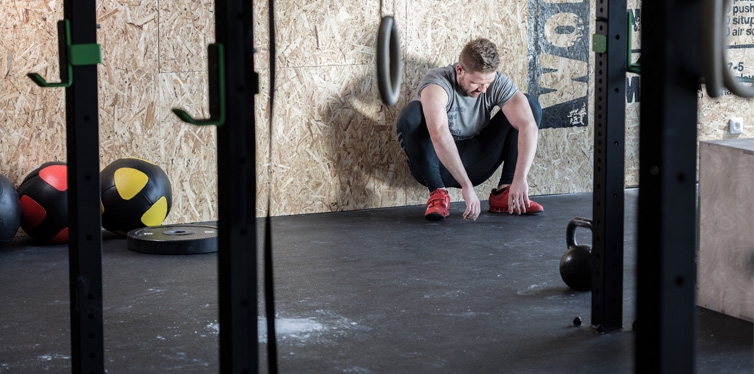Overtraining Signs
We get it. Once you’re in the momentum of training then your workout routines can become addictive – especially once you can see and feel the results. Like with everything in life, however, too much of a good thing can be bad. While some might shrug “overtraining” off as a myth, the reality is that there is a limit.
You see, a crucial component of exercising is to rest. Your body needs time to readjust and heal after a workout so that it can recuperate and respond to the intense strain it has just received. Without resting periods, your workout is imbalanced – almost incomplete. You are focusing more on the hard work and creating an uneven exercise routine that leans more towards one aspect than the other. In other words, you are “over” compensating.
When this occurs, then advice is to consider switching your workout routine, as you are very likely to experience at least one, if not all, of the symptoms below.

1. You’re Always Thirsty
If you crave water to the point where you feel your thirst is never quenched, then there is a good chance you are overtraining.
When you strain your body, you can put it into a catabolic state. If you are constantly training then you remain in this state where muscle tissue is broken down in order to release energy. This catabolic process naturally causes dehydration.
2. You Cannot Get A Good Night’s Rest
If you’re tossing and turning in your sleep, then it could mean that your sympathetic nervous system has gone into overdrive, causing restlessness and the inability to focus.
Your sympathetic nervous system finds it hard to settle when you have been hitting it hard at the gym because it continuously feels like it needs to keep its engine fuelled. This can be detrimental because a good night’s sleep and avoiding sleep deprivation is crucial for thorough training – and to ensure one’s sanity.

3. You’re Uncontrollably Moody
Overtraining can have quite an impact on stress hormones, including cortisol and epinephrine. The end result is a hormonal imbalance that intensifies emotions, often causing mood swings and irritability.
Quite interestingly, if you already have an aggressive, irritable, or depressed personality, then these traits are the first to be enhanced.
4. You Get Sick More Than Normal
While there are many reasons why you could be getting sick more than usual, sometimes overtraining can be the cause. This is because training requires rest and if you are not resting enough, then your body will take a toll. Your immune system could start to fail and you will be more susceptible to nasty germs that like to lurk around the gym.

5. Loss Of Appetite
Essentially, a good dose of training should stimulate one’s appetite. If you train too much however, then the physiological exhaustion of your workout routine can actually lead to a suppressed appetite.
6. You Have Odd Aches And Pains
Are you feeling sore in all the wrong places? Post workout aches and pains are normal but if you are experienced tensed and prolonged pain, especially in arbitrary places, then perhaps you have taken things just a little too far.
Overtraining taxes all of the body’s systems and repairing damaged tissue and muscles might take longer if you are not giving your body enough opportunity to heal. Since your immune system might be compromised, you’re also very likely to pick up other infections.

7. You’re Feeling More Sluggish Than Usual
After a good training session, you should feel rejuvenated. Exercise is great at giving your body a good dose of endorphins, making you feel happy and re-energized.
If you feel sluggish, on the other hand, this could mean that you are overtraining. Instead of experiencing a rush of endorphins, your testosterone and cortisol levels decrease and your body starts to feel fatigued – almost like you are coming down with a cold.
8. Altered Resting Heart Rate
If your morning resting heart rate is increased to more than five beats per minute, this could mean that it is in an overstrained state.
If you’re fixed on your training then you might want to invest in a heart rate monitor to help you keep track of your health. Alternatively, you can track your resting heart rate by placing two fingers on your pulse before you get out of bed in the morning –keeping track of your regular beats per minute.

9. You’re Feeling Stressed Or Depressed
If you find yourself down in the dumps more often than not, it could, once again, simply be a symptom of overtraining. This comes down a combination of imbalanced hormones and a lack of quality sleep.
How Can You Prevent Yourself From Overtraining?
If you are experiencing any of the above symptoms, then you might want to relook at your training schedule. We know how amazing it can feel to push our bodies to the limit but when we over-exert them, we do more harm than good. A well-balanced routine that includes the following should, instead, be maintained:
- At least 6 hours of uninterrupted sleep every night
- A balanced diet that includes a drinking enough water
- Adjust your training technique to ensure that you get sufficient rest in between sessions
- Take some days off every so often so that your body can fully recover from your workouts – taking the time it needs to focus on healing the tissue and muscle you need for further training.
Remember, if you do feel run down or out of sorts, we strongly urge you to consult with a professional who can establish the real root of every problem.
Sources:
- Overtraining | 9 Signs of Overtraining to Look Out For – ACE Fitness
- 9 Signs Of Overtraining And What You Should Do About It – Fitness Crest










